- Home
- Martin Cruz Smith
The Girl From Venice Page 13
The Girl From Venice Read online
Page 13
“You still call him the consul even though you have no consulate?”
“In my eyes, he still is. I hope you don’t mind if we have coffee out on the veranda.”
She disappeared into the kitchen and returned with a tray laden with cups and saucers and a pot of coffee. He brushed dead leaves off a table so that she could set down the tray.
“You just missed Vera,” she said.
“This early in the morning?”
“She never left. She has a lot on her mind and wanted to talk, although talking with Vera is not like having a real conversation.”
“What do you mean?” Cenzo asked.
“She’s a good soul, even if a little self-indulgent and given to fantasy. But as you can see, the population in Salò is diminishing day by day and we put up with each other.”
“I take it she’s a good friend of Mussolini’s mistress.”
“Yes, she takes advantage of Claretta’s friendship, but then Claretta takes advantage of her. She needs a shoulder to cry on.”
“Vera should put as much distance as she can between herself and Claretta,” he said. “What did you talk about?”
“It’s always the same issue: who gets to stay with Benito Mussolini and accompany him to hell.” She poured the coffee. “With Mussolini’s wife, it’s pride. At least with Claretta, it’s love.”
“What about you? Why are you still here?”
“The consul can’t be moved, and besides, we have unofficial diplomatic immunity.”
“That works?”
“It seems to.”
“You’re able to carry on here?”
“There’s always work during a political upheaval.”
“Doing what?”
“This and that.”
Cenzo looked up at a window, because for a moment he thought he saw a figure move behind the drapes.
“What about Otto Klein?” he asked.
“I see a rope and a lamppost in Otto’s future.”
“And Giorgio? What about him?”
“Now, there’s an interesting question. I’ve always asked myself: Is Giorgio a Fascist, a hero, or a film star? Never discount the allure of a film star in Italy.” She reached into a bathrobe pocket for her cigarette case and let him light a cigarette for her. “And now I have question for you, Cenzo: Are you a decoy? If I were you, I would take that question very seriously. Bigger mistakes have been made.”
“I’m not at all like Giorgio.”
“Then you haven’t looked in the mirror lately.”
The dawn was an overarching red. The lemons on the veranda’s trees were dark, ponderous, and ugly. Again Cenzo thought he noticed movement behind the upstairs drapes.
“You know, you shouldn’t fool yourself about Gina,” Maria said. “She was an ordinary girl with a beautiful face. Not a good actress, I’m afraid. She didn’t deserve to die in an air raid. No one does. Yet you’ve sacrificed yourself to her memory. I hope you don’t mind me saying this. I only ask that you consider the possibility.”
“That I’ve been a fool? Isn’t that what love is: blind?”
“And now you have a new quest, this niece of yours.”
“She’s just a girl. Besides, she may not even be alive.”
“Exactly. Next she’ll be a saint.” Maria put her hand out as if she could snatch the words back. “I’m sorry. I’m just a bitter woman having a coffee at the end of the world.”
There was a mechanical sound from the interior of the house, the engagement of a motor, the unreeling of cable, and the opening of an elevator grate. A light went on and a shadowy figure of a man in a robe appeared at the steps of the veranda. He was gray, as if drained and wrapped in cobwebs, and he shuffled forward dragging one foot. A woman in white, apparently a nurse, supported him.
“A visitor?” he asked.
“He was just going, dear,” Maria said.
He blinked. “Did I do well?”
“You did very well.” She turned to Cenzo. “This is my husband, the consul general Alejandro Paz Rodriguez.”
The former consul made an effort to look at Cenzo, but his energy did not extend that far. “Is the visitor going now?” he whispered.
“Yes, dear.”
Maria got up to help the aide steer her husband back to the elevator. To Cenzo she said, “I know what it’s like to love someone unattainable. This is the man I loved. This is the man I still love.”
Cenzo said nothing. If the world was on the point of blowing up, what was there to say?
Maria picked the car keys off the table. “Give me fifteen minutes. I’ll drive you back.”
• • •
Without the finishing touches of makeup, Maria Paz was a blunter beauty in a jumpsuit and sandals, on the prowl in her red convertible.
“The consul was a diplomat in Buenos Aires and I was a juvenile thief. There’s no point in hiding the fact now. I seduced him. It was a scandal and the end of his career. We were allowed to marry if we left the country, so we began making the rounds, serving in lesser embassies. We were a pair. Alejandro was a man of a highborn family and I was his tramp. As you can imagine, being the Argentine consul to the Republic of Salò is the bottom of the pit. The only other nations that recognize Salò are Germany and Japan. The German representative left months ago and the Japanese never did more than send a letter. So you could say that Alejandro and I are what remain of the diplomatic corps. Or I am, after his stroke.”
“What sort of thief were you?” Cenzo asked.
“An accomplished one.” She turned a smile on him. “A forger.”
“Of?”
“Art. The Old Masters. I learned at my father’s knee.”
“As a girl?”
“From the age of ten. I was a loving daughter and helping him work was an education. He died in his studio surrounded by art. That was how the police discovered us. The prosecutor himself owned a Rembrandt painted by my father. I could have laughed.”
“You quit for your husband’s sake?”
“For good, until Otto Klein found out about my past.”
“But there are no Old Masters here to copy.”
“There are, only not paintings. Violins.”
Daylight filled the promenade, revealing 20mm cannons the size of siege catapults and rows of sandbags.
“Violins?”
“By Gasparo da Salò. Sixteenth-century. I may have added one or two.”
“Impossible.”
“Not at all, once you have a credulous buyer and you don’t try to make a great violin, just an old one. You start with an ordinary fiddle with real cracks and wormholes, add some dust and ash and even some repairs. The main thing is to capture the golden quality of the varnish of a true Gasparo da Salò violin.”
“Will it sound like the real thing?”
“That will be up to the buyer’s imagination.”
“You almost sound proud.”
“Like any parent.”
They had reached the Hotel Golfo.
“I think you’re starting to get over Gina.” Maria kissed him softly. She did so slowly but he let it happen. That was the sad part. The mutual yearning. Then a car pulled alongside and Otto Klein wound down his window. “I hope I’m not interrupting anything, but I was wondering how the consul’s health is these days. I think we have time for one more run in the diplomatic pouch.”
“Go away, Otto,” Maria said. “I’m through with all that.”
“Oh, I think the consul is robust enough.”
“It’s blackmail.”
“Between friends? And the thing about blackmail you have to learn is that it’s always based on the truth. Are we agreed? And thank you, Cenzo. You should have been an actor. Your timing was perfect.”
19
He wasn’t sure how he f
elt about Maria Paz. At the start he felt there was too little explained about her and then too much, like a box that might or might not contain high explosives. Nothing in between. Maria had averted her eyes and sped away from the Hotel Golfo without a word of explanation. Otto Klein acted as if blackmail was a normal business and perhaps for him it was.
By morning, the grand exit of the Wehrmacht had begun. Italian soldiers watched with blank faces as German troops marched by. Each side grimly ignored the other, like a marriage breaking up. At German headquarters, between the hospital and the crematorium, office workers started a bonfire of files. Motorcycles raced in twos and threes but not in panic, not yet. Cenzo thought that if any race were capable of dismantling itself in an orderly fashion, it would be Germans.
Cenzo was supposed to report to Giorgio and Colonel Steiner later at the Garda Tunnel, but he had time to kill and he bought a newspaper to read at a café. The headline declared OUR GREATEST WEAPON IS IL DUCE. Well, the Germans had come up with V-2s, Cenzo thought, so it wasn’t impossible that they could stick a rocket up Mussolini’s ass.
He found himself focusing on the police station at the end of the block, and when he saw that the guard post in front of it was not manned, he couldn’t resist strolling in, just to pull the tail of the tiger. Posters admonished the public to report rumors and denounce traitors. On a bulletin board was a list of wanted partisans; sketches of Dante and the Spaniard were prominently displayed. Fascist martyrs were draped in velvet. A police dog wheezed in a corner. A corporal with a pencil-line mustache hunched over his telephone and assured a hysterical woman on the other end of the line that the Germans were only conducting exercises and would return.
The corporal’s eyes widened when he hung up the phone.
“Giorgio Vianello?”
Cenzo had not intended to fool anyone, and for a moment he was undecided, but he saw how simple it would be to assume his brother’s identity. He eased into the role the way he had slipped into Giorgio’s suit of alpaca wool.
The corporal saluted Cenzo and shook his hand. “This is an honor. I’m afraid the commander’s not here, but I am Corporal Fini. How can I assist you?”
“I just need to look around.”
“Here?”
“Yes. We’re considering a film that touches on the work of the National Police.”
“Now?”
“What better time and what better way to boost public morale? I should warn you that this is not definite. Other locations are being considered.”
“Would you be acting in it?”
“We’ll see.”
“Have you been to Hollywood?”
“Of course.”
“Have you met Greta Garbo?”
“Yes.”
“What is she like? Personally.”
“Tall.”
Corporal Fini rubbed his chin. “But you prefer to act in Italian films with Italian actors.”
“For the sake of verisimilitude.”
“Exactly.” The corporal nodded vigorously. “I myself am full of ideas of a cinematic nature. I’d love to sit down and talk to you about them.”
“Sometime. Can I count on your discretion?” Cenzo asked.
“Please.” The corporal screwed up his face in an effort to look trustworthy.
“This is a story about a police officer wrongly accused of abuse of power. Do you keep records of persons who die in police custody?”
“By their own hands, yes. By hanging themselves with a belt, falling out of bed, running into a wall.”
“What about assaulting an officer?”
“It happens every day.”
“In political cases?”
“Most of all. Intellectuals always trip themselves up.” Fini put his finger by his nose. “Always too clever by half.”
Cenzo took out the photo Colonel Steiner had given him showing a man with his head beaten in. “Do you remember what happened to him?”
“Who can say? He looks like a watermelon that rolled off a truck.”
“Do you recognize him?”
“No.”
“He would have come through in the last few weeks. A big man with red hair traveling with a boy?”
“I’m sorry, what do you need this information for?”
“It’s backstory. We build one fictional character out of many.”
“Interesting.”
“Of course we’ll need extras, depending on where we shoot.”
“Now that I think about it, there was a man who generally met your description and he was with a boy.”
“What did the boy look like?”
“Skinny, off the streets, maybe fifteen years old. He had a soft cap. He stood out because a resort like Salò doesn’t have many street urchins. This is not Naples.”
“And he was with this man?” Cenzo tapped the photograph.
“I think so. But it’s hard to say.”
“You had him at headquarters?”
“Yes.”
“If he was here at headquarters, you have a record of his name.”
“No. We eventually let him go.”
“Why?”
“There was no reason to hold him. Someone said he stole a bicycle but it was all a big mistake.”
“So you let him go?”
“There was a ceremony of Fascist loyalty being conducted by the Sons of the She-Wolf when the air raid siren went off. People scattered every which way. We held on to the man but the boy vanished.”
Vanishing was Giulia’s talent, Cenzo thought.
“When was this?”
“About ten days ago.”
“Why did you hold on to the man if there was just a mistake?”
“We didn’t. But Brigade Leader Orsini had some questions of his own for the guy.”
“Orsini was here?”
“That’s right. The last I saw of the man, he was in the leader’s car.” Corporal Fini took a gulp of air. “If they’re talking about shooting a film here, that’s a good sign, isn’t it?”
“I suppose it is.” Cenzo started to leave.
“Not so fast.”
“What?”
“I can’t let you off that easy.” The corporal opened a desk drawer and brought out a camera. “My wife will have my head if she hears that I met Giorgio Vianello and didn’t take a photograph. One thing. Please don’t be offended, but do you do all your own stunts?”
“Of course.”
“I never doubted it.”
20
There were seven tunnels along the Garda Road, each wide enough to accommodate a tank; and where the tunnels opened up, they invited spectacular plunges down to the water. The road was a perfect escape route from Salò to Switzerland. Also a perfect trap.
Colonel Steiner led Cenzo and Giorgio into the shadows of the first tunnel and unscrewed a canteen of water.
“Can you believe this?” the colonel said. “I thought I would be protecting the landmarks of civilization, masterpieces by Titian and Tintoretto. Instead, here I am, preparing to detonate a mountainside.”
“None of us are doing what we thought we would,” Cenzo said.
“You’re right,” said Steiner. “If you had questioned the men on either side of the front before the war and asked them what they thought they would be doing ten years hence, not a single man would say blowing each other up.”
Some soldiers unreeled red demolition lines to bundled sticks of TNT. Some carried satchels heavy with time fuses, detonator caps, igniters, and the basic hardware of crimpers, pliers, hammers, and knives. They used pickaxes to drive holes into the walls. It was warm work, and when an axe skidded and sparked, the soldiers sucked in their breath.
“They’re young,” Cenzo said.
“They’re boys,” Steiner said. “And, like boys, the
y will have their toys.” He stepped over what appeared to be a small “headless” tank, no more than a meter long. “A radio-controlled robot for blowing up mines. Highly entertaining. The only problem is that if a tread is disabled, the robot may go in circles or, worse, return to its maker.”
“Like me,” Cenzo said. “I’m returning too.”
“What do you mean?” Steiner asked.
“Going back to Pellestrina.”
“Like hell you are,” Giorgio said.
Steiner said, “You can’t be serious. You have a real talent for this sort of work. Now you’re thinking of quitting?”
“I wanted to find Giulia and instead I’m going in circles. I’m not a spy.”
“I never thought you were. A catalyst is what you are.” Steiner paused. “Listen to these incredible echoes. Like trolls at work. No, you are doing fine. You’re still our best chance of finding Giulia. And this Argentinian woman with a criminal background? She should be exploited.”
“Not by me.” Cenzo shot a glance at Giorgio. “It’s as if you’re playing a game and keeping the rules to yourself.”
“Minor details.”
“Such as?”
The colonel measured his words. “Vittorio Silber was a businessman with international connections.”
“Even after Mussolini started rounding up the Jews?”
“Silber was protected.”
“Not a fool who waited and waited and ran too late?”
“Hardly. He knew what his chances were and he took them.”
“To what?” Cenzo asked.
“To come out of hiding and make contact. To negotiate an end to this endless war. To make sure that these boy soldiers would not blow up themselves or anybody else. Our rocket launcher has a bad habit of spontaneously firing. Half our weapons are sabotaged. That’s what comes from using slave labor.”
As a Panzer tank rolled inside, it seemed to turn the entire tunnel into the barrel of a gun. The young men laying charges were encouraged, even though the Panzer was slow and clumsy, a heavy-breathing monster and no friend of narrow spaces.
“Aren’t there negotiations for peace?” Cenzo asked.
“Of course,” Giorgio said. “For months and each time we are betrayed. We’re hoping that Giulia would recognize the man who betrayed her father, the man who is holding up negotiations.”

 Polar Star
Polar Star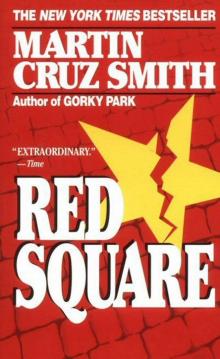 Red Square
Red Square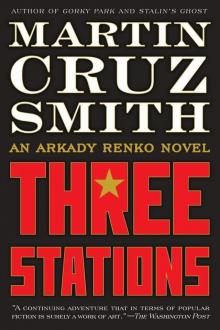 Three Stations
Three Stations Wolves Eat Dogs
Wolves Eat Dogs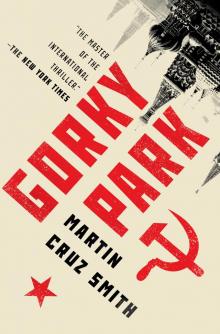 Gorky Park
Gorky Park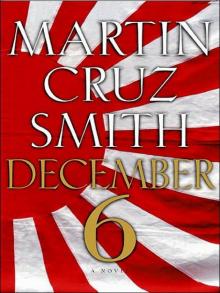 December 6
December 6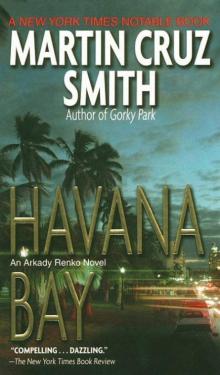 Havana Bay
Havana Bay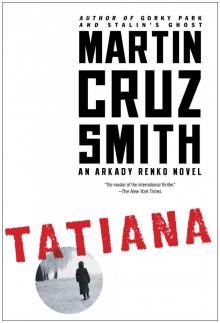 Tatiana
Tatiana The Girl From Venice
The Girl From Venice Stalin's Ghost
Stalin's Ghost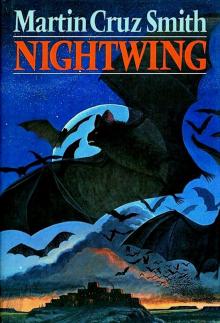 Nightwing
Nightwing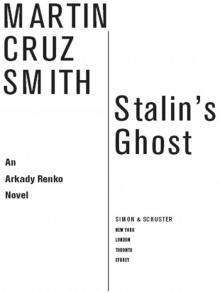 Stalin s Ghost
Stalin s Ghost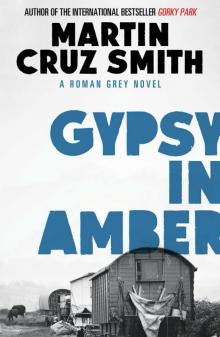 Gypsy in Amber
Gypsy in Amber Rose
Rose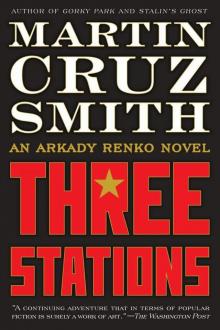 Three Stations: An Arkady Renko Novel
Three Stations: An Arkady Renko Novel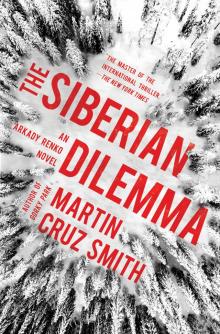 The Siberian Dilemma
The Siberian Dilemma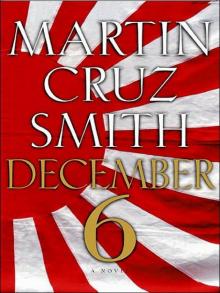 December 6 (V5.0)
December 6 (V5.0)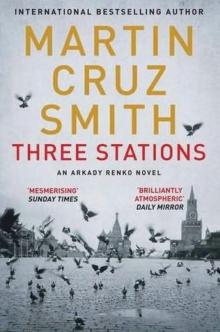 Three Stations ar-7
Three Stations ar-7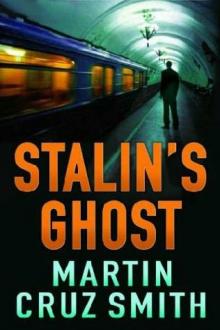 Stalin’s Ghost ar-6
Stalin’s Ghost ar-6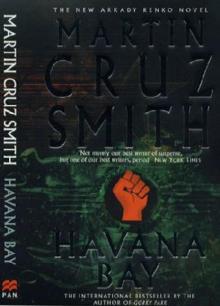 Havana Bay ar-4
Havana Bay ar-4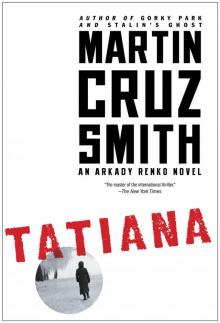 Tatiana ar-8
Tatiana ar-8